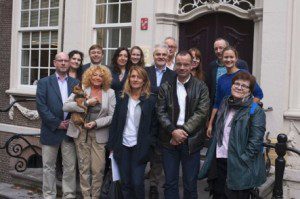On 16 and 17 October in Utrecht, organisations from six European countries initiated a programme for the development of a reference framework for the education and training of literary translators. For the first time, European teachers came together to discuss the knowledge and skills required by a literary translator.
The European Commission has made an Erasmus+ subsidy of € 277,482 available for this two-year project. The grant is allocated to a consortium of eight organizations: Utrecht University, KU Leuven, Dutch Language Union, Fondazione Universitaria San Pellegrino, Eötvös Loránd University Budapest, Deutscher Übersetzerfonds, the British Centre for Literary Translation, and CEATL, the European network of organisations for literary translators.
The project is named ‘Petra-E’: ‘Petra’ stands for ‘Platforme Européenne pour la traduction littéraire’ (European Platform for Literary Translation) and ‘E’ for ‘Education’. The development of a European framework was one of the most important recommendations put forward at the PETRA Congress in Brussels in 2011, which looked at ways to improve literary translation in Europe.
Petra-E’s reference framework is similar to the Common European Framework for Language Learning, except that it describes the specific knowledge and skills required by any good literary translator. Particularly important are language proficiency in the source and target language and knowledge of the source and target cultures and literatures, with their different systems and schools of thought.
One of the aims of the reference framework is to facilitate collaboration between European schools for literary translation. This is very important as the education and training of literary translators is of necessity a small-scale affair. The literary translation market is limited in size, but the number of possible language combinations is extremely large (e.g. Dutch-Portuguese, Portuguese-Hungarian). It is a varied and fragmented field of university and non-university education, often provided by translators’ organisations. Closer collaboration between translation schools can help overcome the disadvantages inherent in the small-scale character of education and training for literary translators. Utrecht University – the applicant organisation – and KU Leuven created a basis for the reference framework when they developed a learning pathway for literary translators who translate works into Dutch.
For more information, please click here (http://taalunieversum NULL.org/inhoud/petra-e).
 (http://www NULL.ceatl NULL.eu/wp-content/uploads/2014/10/netherlands NULL.petraE NULL.foto_ NULL.okt14 NULL.jpg)
(http://www NULL.ceatl NULL.eu/wp-content/uploads/2014/10/netherlands NULL.petraE NULL.foto_ NULL.okt14 NULL.jpg)Petra-E in Utrecht.
